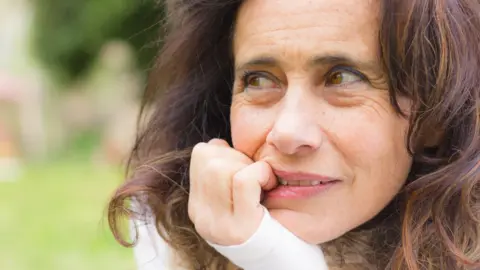Egg freezing in your 40s 'not sensible'
 Getty Images
Getty ImagesClinics must make it clear that there is little point in women over 40 freezing their eggs, because the odds of a future pregnancy are very slim, says UK fertility regulator the HFEA.
Fertility declines with age, so the optimum time for egg freezing is before a woman turns 35, it says.
Yet data shows that the most common age at which women are treated is 38, with many freezing eggs into their 40s.
NHS clinics usually have a younger cut-off age, but private ones may not.
Women can only get egg freezing on the NHS if it is for medical reasons, such as needing a cancer treatment which may cause them later fertility problems.
Private clinics also offer it to women who want it for social reasons, like delaying starting a family because they haven't met the right partner yet.
In 2016, 80% of the 1,310 freezing procedures carried out were done in private clinics,
 Getty Images
Getty ImagesAround 890 of all the treatments were for women aged 35 and over, compared with 419 treatments for women younger than this.
The HFEA says it is not clear why patients of this age are freezing eggs. Most women freezing eggs using NHS funding were aged below 35, with 89% below 38.
It says women must be given clear information about the risks, costs and likely success rates of egg freezing, which is becoming an increasingly popular "fertility insurance" back-up plan.
Egg freezing facts
- Success rates can be low
- Egg quality and number naturally drops as a woman gets older
- It is not a simple fix for delaying motherhood
- NHS funding may be available if you are having medical treatment that affects your fertility
- Frozen eggs can usually only be stored for 10 years (although there are some exceptions for medical reasons)
Egg freezing costs anywhere between £2,720 and £3,920 per go.
Most clinics will include a couple of years of storage in that price, but there may be an extra annual charge of up to £350 for that service.
The complete cost if you then opt to thaw and use your eggs in a future treatment, is £7,000 to £8,000.
Birth rates from frozen own eggs are increasing but remain below that of conventional IVF treatment cycles, being successful one in every five times, on average, compared to around one in three for "fresh egg" IVF.
While a woman's age at thaw has relatively little impact on a woman's chances of success, the age at freeze does, with evidence suggesting that if eggs are frozen below the age of 35, the chances of success will be higher than the natural conception rate as the woman gets older, says the HFEA.
HFEA Chair Sally Cheshire said: "Clinics have an ethical responsibility to be clear that egg freezing below the age of 35 offers women their best chance of creating their much longed-for family."
Aileen Feeney from Fertility Network said women should know their fertility "vital statistics" 28:35:42: "By 28, female fertility has already begun to fall; 35, female fertility plummets; 42, your chance of becoming a biological mother is vanishingly small."
Prof Simon Fishel, from the independent IVF provider CARE Fertility Group, said women face a hard choice, knowing that if they freeze eggs early they can still only be stored for 10 years.
